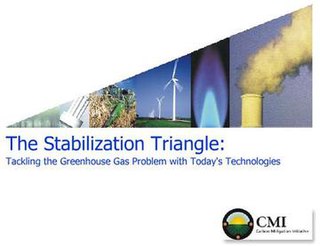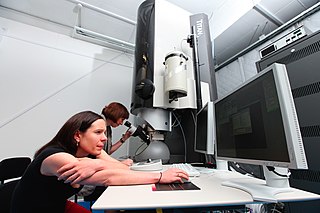Related Research Articles

The National Energy Technology Laboratory (NETL) is a U.S. national laboratory under the Department of Energy Office of Fossil Energy. NETL focuses on applied research for the clean production and use of domestic energy resources. It performs research and development on the supply, efficiency, and environmental constraints of producing and using fossil energy resources while maintaining affordability.

Fouling is the accumulation of unwanted material on solid surfaces. The fouling materials can consist of either living organisms (biofouling) or a non-living substance. Fouling is usually distinguished from other surface-growth phenomena in that it occurs on a surface of a component, system, or plant performing a defined and useful function and that the fouling process impedes or interferes with this function.
Vernon Charles Gibson is a British scientist who served as Chief Scientific Adviser at the Ministry of Defence between 2012 and 2016. He was reappointed to the MoD CSA role in May 2023. He is visiting professor at Imperial College London and the University of Oxford, Honorary Professor at the University of Manchester. He delivered the Royal United Services Institute (RUSI) Prince Philip Lecture on Military Education in Nov 2023.
David Pines was the founding director of the Institute for Complex Adaptive Matter (ICAM) and the International Institute for Complex Adaptive Matter (I2CAM), distinguished professor of physics, University of California, Davis, research professor of physics and professor emeritus of physics and electrical and computer engineering in the Center for Advanced Study, University of Illinois at Urbana–Champaign (UIUC), and a staff member in the office of the Materials, Physics, and Applications Division at the Los Alamos National Laboratory.

Mark Diesendorf is an Australian academic and environmentalist, known for his work in sustainable development and renewable energy. He currently teaches environmental studies at the University of New South Wales, Australia. He was formerly professor of environmental science and founding director of the Institute for Sustainable Futures at the University of Technology, Sydney and before that a principal research scientist with CSIRO, where he was involved in early research on integrating wind power into electricity grids. His most recent book is Sustainable Energy Solutions for Climate Change.

The Tyndall Centre for Climate Change Research is an organisation based in the United Kingdom that brings together scientists, economists, engineers and social scientists to "research, assess and communicate from a distinct trans-disciplinary perspective, the options to mitigate, and the necessities to adapt to current climate change and continuing global warming, and to integrate these into the global, UK and local contexts of sustainable development".

Climate stabilization wedges are used to describe possible climate change mitigation scenarios and their impact, through the grouping of different types of interventions into "wedges" representing potential decreases in CO2 emissions. When stacked on top of each other, wedges form a "stabilization triangle" that represents the estimated amount of carbon that needs to be removed from the atmosphere to flatten carbon emissions and prevent atmospheric carbon from doubling. This framework is used to organize complex information about mitigation strategies for presentation to policy makers and the public, with the goal of stimulating both technological change and policy actions to deploy precommercial and existing technologies.
The Faculty of Science and Engineering (FSE) is one of the three faculties that comprise the University of Manchester in northern England. Established in October 2004, the faculty was originally called the Faculty of Engineering and Physical Sciences. It was renamed in 2016, following the abolition of the Faculty of Life Science and the incorporation of some aspects of life sciences into the departments of Chemistry and Earth and Environmental Sciences. It is organised into 2 schools and 9 departments: Chemical Engineering and Analytical Science; Chemistry; Computer Science; Earth and Environmental Sciences; Physics and Astronomy; Electrical & Electronic Engineering; Materials; Mathematics; and Mechanical, Aerospace and Civil Engineering.

Dimitris Drikakis, PhD, FRAeS, CEng, is a Greek-British applied scientist, engineer and university professor. His research is multidisciplinary. It covers fluid dynamics, computational fluid dynamics, acoustics, heat transfer, computational science from molecular to macro scale, materials, machine learning, and emerging technologies. He has applied his research to diverse fields such as Aerospace & Defence, Biomedical, and Energy and Environment Sectors. He received The William Penney Fellowship Award by the Atomic Weapons Establishment to recognise his contributions to compressible fluid dynamics. He was also the winner of NEF's Innovator of the Year Award by the UK's Institute of Innovation and Knowledge Exchange for a new generation carbon capture nanotechnology that uses carbon nanotubes for filtering out carbon dioxide and other gases.

Ellen D. Williams is an American scientist, best known for her research in surface properties and nanotechnology, for her engagement with technical issues in national security, as chief scientist of BP, and for government service as director of ARPA-E.
The Global Apollo Programme was a historic call for a major global science and economics research programme to make carbon-free baseload electricity less costly than electricity from coal by the year 2025.

Philip John Withers is the Regius Professor of Materials in the School of Materials, University of Manchester. and Chief Scientist of the Henry Royce Institute.
In 2016 the Women's Engineering Society (WES), in collaboration with the Daily Telegraph, produced an inaugural list of the United Kingdom's Top 50 Influential Women in Engineering, which was published on National Women in Engineering Day on 23 June 2016. The event was so successful it became an annual celebration. The list was instigated by Dawn Bonfield MBE, then Chief Executive of the Women's Engineering Society. In 2019, WES ended its collaboration with the Daily Telegraph and started a new collaboration with The Guardian newspaper.

The Henry Royce Institute is the UK’s national institute for advanced materials research and innovation. Its vision is to identify challenges and to stimulate innovation in advanced materials research to support sustainable growth and development. Royce aims to be a "single front door" to the UK’s materials research community. Its stated mission is to “support world-recognised excellence in UK materials research, accelerating commercial exploitation of innovations, and delivering positive economic and societal impact for the UK.”

Andrew William Woods is BP Professor at the University of Cambridge and a professorial fellow of St John's College, Cambridge.
Camille Petit is a Reader in Materials Engineering at Imperial College London. She designs and characterises functional materials for environmental sustainability.

Sarah Jane Haigh is a Professor in the School of Materials at the University of Manchester. She investigates nanomaterials using transmission electron microscopy, including two-dimensional materials such as graphene.
Allan Matthews (1952) is professor of surface engineering and tribology at the University of Manchester and director of the Digitalised Surfaces Manufacturing Network.
Paola Lettieri is a British-Italian chemical engineer who is a Professor of Chemical Engineering and Pro-Provost of UCL East at University College London. Her research considers fluidisation and life-cycle assessment. She has developed novel, sustainable fluid-bed processes.
High Meadows Environmental Institute at Princeton University in Princeton, New Jersey is an interdisciplinary center for environmental research that studies effects of and solutions to climate change and other environmental threats. The International Center for Climate Governance named the Princeton Environmental Institute the second-highest climate change think tank in the global category for 2012, following the Belfer Center for Science and International Affairs.
References
- ↑ "ICAM - International Centre for Advanced Materials". www.icam-online.org. Retrieved 11 August 2020.
- ↑ Sverdrup, Knut; Almgren, Ann; Nikiforakis, Nikolaos (1 September 2019). "An embedded boundary approach for efficient simulations of viscoplastic fluids in three dimensions". Physics of Fluids. 31 (9): 093102. arXiv: 1905.07392 . Bibcode:2019PhFl...31i3102S. doi:10.1063/1.5110654. ISSN 1070-6631. S2CID 158046795.
- ↑ Kaimaki, D.-M.; Haire, B. T.; Ryan, H. P.; Jiménez-Serratos, G.; Alloway, R. M.; Little, M.; Morrison, J.; Salama, I. E.; Tillotson, M. J.; Smith, B. E.; Moorhouse, S. J. (11 July 2019). "Multiscale Approach Linking Self-Aggregation and Surface Interactions of Synthesized Foulants to Fouling Mitigation Strategies". Energy & Fuels. 33 (8): 7216–7224. doi:10.1021/acs.energyfuels.9b01390. hdl: 10044/1/72196 . ISSN 0887-0624. S2CID 199069766.
- ↑ Hsieh, Linda (9 August 2012). "BP to establish $100 million center to research advanced materials". Drilling Contractor. Retrieved 11 August 2020.
- ↑ Georghiou, Luke (2015). "Strategy to Join the Elite: Merger and the 2015 Agenda at the University of Manchester – An Update" (PDF). Mergers and Alliances in Higher Education: International Practice and Emerging Opportunities. Springer International Publishing. p. 218. doi:10.1007/978-3-319-13135-1_10. ISBN 978-3-319-13135-1.